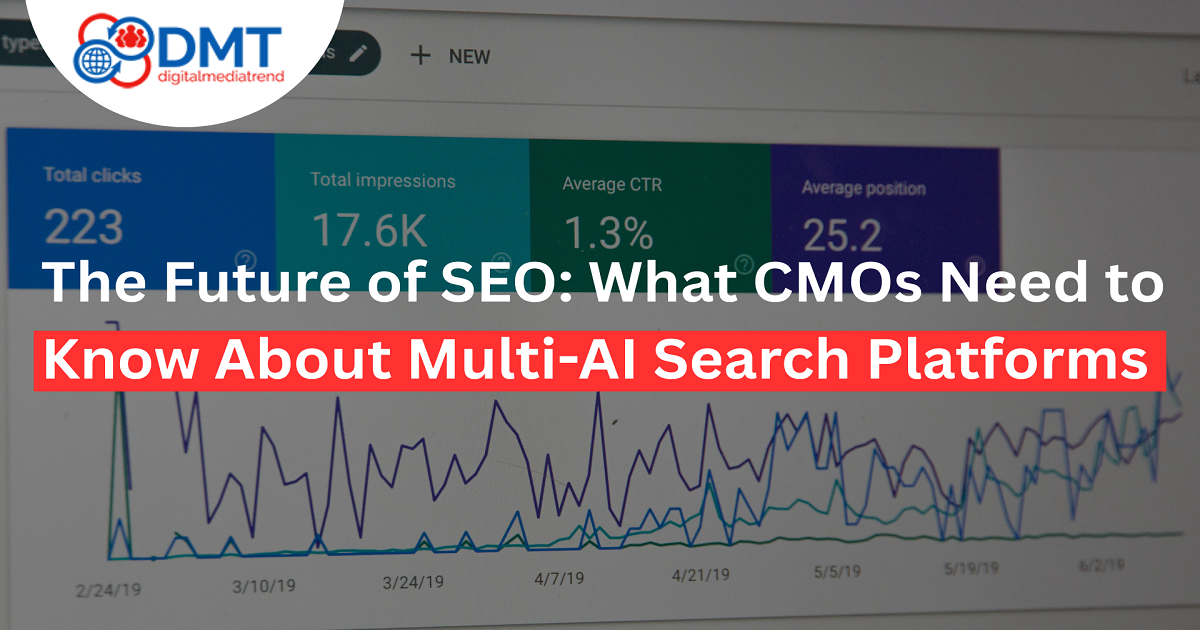In the past decade, SEO has been defined largely by one constant: optimizing for Google. But the landscape is shifting rapidly. Artificial intelligence (AI) has brought with it new search behaviors, diverse platforms, and evolving user expectations. As a result, CMOs today face a dramatically more complex SEO ecosystem—one where success depends on understanding and preparing for multi-AI search platforms.
For marketing leaders in fast-growing markets like Pakistan, especially with digital agencies such as DMT Lahore at the forefront, this shift presents both a challenge and an opportunity. CMOs must rethink their SEO strategies to stay competitive, relevant, and visible in this AI-driven search revolution.

What Are Multi-AI Search Platforms?
Traditionally, “search” meant Google. But today, search is fragmented across a variety of AI-driven tools and platforms:
- AI Chatbots like ChatGPT, Gemini, and Claude, which provide conversational search results.
- Voice Assistants such as Alexa, Siri, and Google Assistant.
- E-commerce Search Engines like Amazon’s AI-driven recommendations.
- Social Media AI Search on platforms like TikTok, Instagram, and YouTube.
This diversification means that brands are no longer competing for visibility on just one search engine—but across an entire ecosystem of AI-powered platforms.
Why This Matters for CMOs
For CMOs, the implications of this shift are profound:
- Customer Journeys Are Changing
Consumers now use AI tools at multiple touchpoints—from research to purchase decisions. A CMO’s job is to ensure brand presence wherever these micro-journeys happen. - Search Visibility Is No Longer Centralized
Winning on Google alone is insufficient. A brand must now optimize for how AI platforms gather, rank, and present information. - AI Shapes Brand Authority
AI-powered platforms often pull information from trusted sources, high-quality content, and brand mentions across the web. This puts a premium on thought leadership, content credibility, and authority building. - First Movers Will Gain Advantage
CMOs who adapt early to multi-AI search strategies will position their brands as leaders in this emerging space.
How AI Is Redefining SEO
Let’s explore the major ways multi-AI search platforms are changing the rules of SEO:
- Conversational Search
Instead of typing keywords, users are now asking full questions in natural language. AI tools respond with contextual, curated answers. This requires SEO strategies that focus on intent, not just keywords.
- Zero-Click Search
AI assistants often summarize answers without linking back to websites. CMOs must design content strategies that increase brand visibility within the AI-generated results themselves.
- Multi-Platform Optimization
From Amazon product search to YouTube video rankings, SEO is now platform-specific. CMOs must ensure their brand presence across all relevant platforms where their audience spends time.
- Trust & Authority Signals
AI platforms prioritize authoritative, credible sources. Building brand authority through PR, backlinks, and industry recognition has never been more critical.
- Personalization at Scale
AI uses user behavior data to deliver personalized results. This makes customer experience, brand consistency, and first-party data collection essential pillars of modern SEO.
A CMO’s Roadmap to Multi-AI SEO Success
For CMOs, the shift to multi-AI search is not a risk—it’s a roadmap to growth. Here’s how marketing leaders can prepare:
Step 1: Rethink Keyword Strategy
Move beyond traditional keyword research. Focus on questions, conversational queries, and long-tail search terms that reflect real human intent.
Step 2: Invest in Content Authority
High-value, expert-led content wins in AI-driven searches. CMOs must push their teams to create original, trustworthy, and multimedia-rich content—blogs, videos, podcasts, and infographics.
Step 3: Optimize Across Platforms
Different platforms have unique algorithms. For example:
- Amazon rewards optimized product listings.
- TikTok prioritizes trending, short-form video content.
- Chatbots highlight sources cited as authoritative.
CMOs must customize their SEO strategies to fit each ecosystem.
Step 4: Double Down on Brand Visibility
AI-driven searches rely heavily on brand mentions across the web. PR campaigns, social listening, influencer collaborations, and digital reputation management are critical.
Step 5: Build First-Party Data Systems
As AI platforms become more sophisticated, reliance on third-party cookies diminishes. CMOs should prioritize CRM integration, email marketing, and direct customer engagement to own their data.
Step 6: Collaborate with AI-Savvy Agencies
Partnering with innovative agencies like DMT Lahore, who specialize in data-driven marketing and AI-based optimization, can give CMOs a competitive edge.
The Competitive Advantage of Early Adopters
History shows that marketing leaders who embrace disruptive technology early tend to dominate their industries. By preparing for multi-AI search platforms now, CMOs can:
- Gain visibility in emerging AI channels before competitors.
- Secure top-of-mind brand recognition when AI assistants recommend solutions.
- Future-proof their SEO strategies against algorithm changes.
- Strengthen customer trust and loyalty through credible, AI-recognized brand authority.
FAQs
- What are multi-AI search platforms?
Multi-AI search platforms include AI-powered tools like chatbots, voice assistants, social media search engines, and e-commerce platforms that deliver personalized and conversational search results. - Why should CMOs care about AI-driven search?
AI-driven search changes how customers find and interact with brands. CMOs who adapt will ensure visibility, authority, and competitiveness in this evolving landscape. - How is SEO different in an AI-first world?
SEO in an AI-first world prioritizes intent, conversational queries, authority, and cross-platform optimization rather than just traditional keyword rankings. - What role does content play in AI-driven SEO?
Content is central. AI platforms highlight brands with high-quality, trustworthy, and authoritative content—making strong content strategies essential. - How can agencies like DMT Lahore help with AI-focused SEO?
Agencies like DMT Lahore specialize in AI-driven marketing strategies, platform-specific optimization, and building brand authority, helping CMOs stay ahead of competitors.

